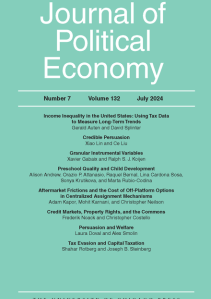<p>This essay discusses the merits of public intervention in the provision of television broadcasting services. I argue that intervention was justified in the past, when there were just a few channels and when advertising was the sole source of commercial funds. However, the advent of subscription television overcomes many of the market failures that once existed. Moreover, asymmetric treatment of broadcasters acts to distort the incentives of commercial broadcasters. Finally, viewers have an increasing ability to avoid unappealing, but perhaps socially desirable, content, which further weakens the case for public intervention in the market.</p>
Authors

Mark Armstrong
Journal article details
- Publisher
- Blackwell Publishing
- ISSN
- Print: 0143-5671 Online: 1475-5890
- JEL
- D62, L15, L33, L82
- Issue
- September 2005
Suggested citation
Armstrong, M. (2005). 'Public service broadcasting' (2005)
More from IFS
Understand this issue

Knowing what we need to do is not the same as actually doing it
comment
The new government has tough choices to make if it is to achieve its stated ambition of delivering growth
8 July 2024

Childcare and the early years: what are the new entitlements and how will they be delivered?
explainer
IFS Associate Director Christine Farquharson explains.
1 July 2024

Levelling up: it’s time to step up
comment
The gap in employment rates between the best- and worst-performing areas is at its widest since 2005, says Christine Farquharson.
30 June 2024
Policy analysis

How would the parties’ tax and spending plans affect Scotland and Wales?
report
This ‘explainer’ looks at how the parties’ proposals would affect Scotland and Wales, covering tax, spending, public finances and the constitution.
28 June 2024

Free breakfast clubs in schools: what Labour’s plans would mean for pupils and families
comment
Labour’s manifesto promises free breakfast clubs in all primary schools. This comment examines possible benefits and challenges with the policy.
25 June 2024

What are the parties’ plans for benefits and taxes?
calculator
Use our simple interactive tool to see how the parties’ plans for benefits and taxes would impact household incomes over the next five years.
24 June 2024
Academic research

Preschool quality and child development
journal article
Globally, preschool enrollment has surged, but its quality is often poor. We evaluate strategies to improve quality of public preschools in Colombia.
8 July 2024

Fiscal Studies: Volume 45, Issue 2
journal issue
Fiscal Studies: Volume 45, Issue 2
28 June 2024

Income inequality in Ireland, 1987–2019
journal article
This paper highlights an aspect of the Irish experience that does stand out as quite remarkable.
28 June 2024